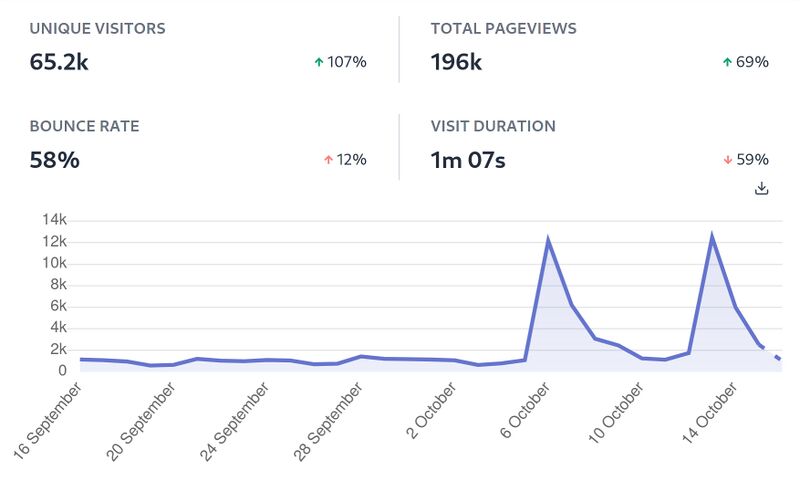Plausible Analytics Switches From MIT To GNU AGPL License Due To Competition
Plausible Analytics is a free software web analytics platform designed to run in a Docker container and a corporation based in Estonia, Europe. They discovered that developing web analytics software and giving it away for free results in competing corporations building services around said software in direct competition to your own services.
written by 윤채경 (Yoon Chae-kyung) 2020-10-16 - last edited 2020-10-17. © CC BY

Screenshot of statistics made by Plausible Analytics from plausible.io/plausible.io because deploying it on your own servers is a cumbersome nightmare beyond belief.
It's an old story: Some young naive idealistic hippie makes some piece of software and gives it away for free and a big corporation like Microsoft comes along and uses it to build their Windows XP operating system, sold commercially to millions of users, without giving Richard Stallman a dime or credit for the Bison parser they used to build it.
Uku Täht and Marko Saric wrote the somewhat light-weight Plausible Analytics web analytics platform and started a small Estonia-based corporation offering hosting and other services around that platform. They made the software itself free software under the MIT Software License.
The MIT license is very liberal; you can make changes to MIT licensed software and sell it or provide services for it with no pesky obligation requiring you to give anyone a glimpse of your source code. The GNU General Public License does have such a requirement, but you can kind of get around that by offering services based on GNU GPL licensed source-code. You're soft-of not actually selling the software if you set it up on your own server and sell access to services on that server. The GNU Affero General Public License is specifically written to close that loop-hole:
"Notwithstanding any other provision of this License, if you modify the Program, your modified version must prominently offer all users interacting with it remotely through a computer network (if your version supports such interaction) an opportunity to receive the Corresponding Source of your version by providing access to the Corresponding Source from a network server at no charge, through some standard or customary means of facilitating copying of software."
The Plausible Analytics developers Uku Täht and Marko Saric discovered that several corporations where using the Plausible Analytics software to create competing products under their own brands as the MIT Software License allows. This prompted them to change the Plausible Analytics license to the more restrictive GNU Affero General Public License v3.0 on October 12th, 2020. The reason is plainly spelled out in their announcement:
"The change will affect corporations that want to take our code and use it to create and sell proprietary tools that directly compete with us."
by Marko Saric, October 12th, 2020
Using MIT-licensed software to create competing products is allowed and perfectly fine, and legal. It's a reality and something to be aware of when you choose a software license.
Consider the following if you're wondering if you should license your cloud software under the MIT Software License or the GNU Affero General Public License:
"here’s what we are trying to accomplish with it:
- We want to prevent corporations from taking our code and using it as part of their closed-source proprietary products
- We want to prevent corporations from offering Plausible as a service without contributing to the open source project
- We want to prevent corporations from confusing people and making them think that the service they sell is in any shape or form approved by the original team"
by Marko Saric, October 12th, 2020
The GNU Affero General Public License is worth a look if you make free software for "the cloud" and you feel the same way about competitors, or corporations in general, using your software. They are still allowed to use the software under the GNU AGPL, but they are obligated to make any changes they make to the source-code publicly available.
You can learn more about the Plausible Analytics platform at plausible.io. Two thirds of the links on that site are set top open in target="_blank" (a new window or a new tab) making it a horrible site to navigate. You can, if you're very patient, find out that Plausible Analytics is designed to run on NodeJS in a Docker container on a cloud instance. Don't bother trying to install it on a bare metal shared hosting service. It's for the cloud. And even then it's a nightmare to setup and configure - which is probably why there's a market for paid hosting services for it.


Enable comment auto-refresher